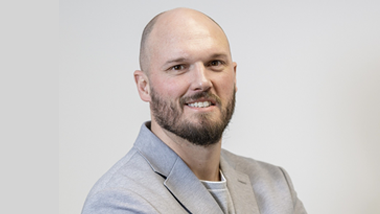Mental health in high performance: lessons from a pro athlete

On this World Mental Health Day, the Robert Walters Group hosted a webinar for our employees featuring ex-professional athlete Cory Paterson. During this session, Cory shared invaluable insights on maintaining mental well-being in high-performance environments.
Cory recently joined Robert Walters Group as a Sales Executive at Resource Solutions but prior to that he was a professional rugby league player where he experienced the demands of a high-performance culture and expectations to succeed which can impact on mental wellbeing both positively and negatively.
Throughout his 14-year career, Cory played over 250 games in the NRL in Australia, as well as the English Super League. Following his retirement from elite sports, he worked as the player welfare manager for the Salford Red Devils where he was responsible for the pastoral care of the players including their mental health, education and overall wellbeing. Cory has been involved in work on suicide prevention in local communities and been a mental health ambassador.
Here, Cory shares the valuable lessons in mental well-being that he gained from his rugby career, which are highly applicable to the corporate world.
Tackling performance anxiety
“If you're experiencing anxiety regarding your performance, it's important to remember that your performance is likely not as bad as you think. Performance anxiety often arises from perceptions we create in our minds when things aren't going well, but generally, it's never as disastrous as we imagine.”
“When performance anxiety surfaces, it's important to focus on developing a level-headed perspective and assessing your efforts rather than fixating on your results. You can't win every game you play, close every deal you attempt, or achieve every goal set before you.”
“What you can evaluate is your effort and preparation. Life is inherently unpredictable, but did you do everything within your capacity? Were you fully engaged? Did you put in the work?”
“Even if you believe you could have performed better or fell short of expectations, there's always room for growth. Even if you feel you didn't perform at your best or couldn't seal a deal, assess your effort rather than dwelling on the outcome, and learn from the situation to enhance your future performance.”
“Stay open to feedback, be willing to explore different approaches, and if you're not achieving your desired results, don't hesitate to try again. Persevere, keep pushing forward, and continue seeking ways to improve; your persistence will eventually yield fruitful results.”
Navigating criticism and feedback
“As a former professional rugby player, I've learned the importance of developing resilience in the face of criticism, owing to the relentless high-performance expectations that come with the sport. Transitioning into the corporate world, I've found that this skill is equally vital in the high-pressure business environment.”
“First and foremost, it's crucial to be discerning about whose feedback you allow to influence you. Whether on the rugby field or in the corporate arena, distinguishing between criticism from external sources like journalists or social media and feedback from your coach or manager is essential. Focus your attention on individuals who genuinely have your best interest at heart.”
“Both rugby coaches and corporate managers share a common responsibility – to provide feedback on performance and offer guidance for improvement. Receiving negative feedback can be challenging, often making us question our competence or self-worth. However, it's essential to remember that your superiors typically don't harbour personal dislikes; rather, they aim to support your growth by highlighting areas for improvement.”
“It's important to recognize that those in leadership positions often face substantial pressure, which can occasionally filter down to their feedback. When confronted with negative criticism, detach the personal aspect from it and instead consider how you can use their insights to enhance your skills and capabilities in the areas they've identified. This approach not only promotes personal growth but also strengthens your position within the team or organization.”
Fostering work-life harmony
“In today's fast-paced world, striking a work-life balance can be a real challenge, especially with the growing number of people working remotely. Allow me to share what I've learned over the years, beginning with a technique I call "decompression." During my rugby career, I faced tremendous pressure from fans, media, and coaches, leading to stress upon returning home. That's when I discovered the power of decompression.”
“Decompressing involves leaving work-related stress at the door. When I arrive home, I dedicate 10 to 15 minutes in my car to clear my mind. It's crucial to remember that my loved ones inside deserve a stress-free environment. This principle applies to both work and home life, even for those working from home.”
“You can decompress during your commute, daily walk, or even in the shower – finding two to five minutes alone is key. The goal is to release stress, centre yourself, and remind yourself that the people you're about to interact with aren't responsible for work frustrations.”
“Interestingly, this approach works both ways. Bringing personal issues to work can lead to conflicts with colleagues, creating a cycle of stress. Therefore, remember to decompress at every transition in your day. When you arrive at work, take a moment to clear your mind. When you leave, wish everyone a great day, reflect on home matters, and return with a clear, less emotional perspective.”
Bouncing back from failure
“As I reflect on my journey, one thing that stands out to me is the importance of perseverance. We're all bound to face setbacks and challenges; that's just a part of life. However, what separates high achievers from the rest is their unwavering determination to keep pushing forward.”
“Failure is a natural part of the process, and it's how you react to those failures that truly matters. Throughout my life, I've held onto the belief that, when I reach the end of my days, I want to say, "I didn't give up." Yes, I've stumbled and fallen in various aspects of my life, but I've always given it my all. That's the only thing you can control – your effort and your resilience.”
“I firmly believe that failure is where growth and learning occur. The pain you feel when you think you've failed is a crucial part of the journey. Some people shy away from that pain and retreat to their comfort zones, never truly pushing their boundaries. Others, however, embrace it. They understand that taking those hits, facing rejection, and experiencing failure are all stepping-stones toward personal and professional development.”
“In the end, life is a journey, and it's essential to savour the present while working toward future aspirations. It's about recognizing that the failures and challenges we face are not roadblocks but stepping-stones on our path to personal and professional growth. So, never give up, keep learning, and embrace the journey.”
“In closing, I want to emphasize that the insights I've shared aren't just about high-performance environments; they're about life itself. Whether it's dealing with performance anxiety, learning from criticism, finding that work-life balance, or bouncing back from failure, these lessons are universal. They're about nurturing your mental well-being and embracing every challenge as an opportunity for growth. So, remember, in your journey, never give up, keep learning, and fully embrace the path you're on because things happen for you, not to you.”
Share this:






